How to Become a DevOps Engineer
Learn what it means to be a DevOps engineer, the tools and processes that you need to know, how to prepare for a DevOps interview, and courses and certifications to help you land your dream job.
Join the DZone community and get the full member experience.
Join For FreeWith the term "DevOps" gaining popularity every day, there is increased curiosity as to how one can become a DevOps Engineer. If you are curious as to how to become a DevOps Engineer, this article goes on to detail on DevOps, the skills required for a DevOps Engineer, roles and responsibilities teamed with interview questions and average salary expected.
Read this article before you start your journey as a DevOps Engineer.
What Is DevOps?
The term "DevOps" was first coined by Patrick Debois in 2009. Since then, it has spread and evolved into DevOps we know today. DevOps brings together Development and Operations to rapidly speed up the delivery process. The need for DevOps came from the drawbacks of Agile that slowly were turning to be a bottleneck in fast delivery. As Development teams would rapidly push new changes per sprint, Operations teams struggled with maintaining stability and security in applications at such rapid speed.
Bringing together both Developers and Operation Engineers, DevOps bridged the gap between processes. Teams understood each other's requirements, prepared, and planned accordingly. DevOps uses various tools and processes to enable better collaboration and communication between teams. Added infrastructure flexibility with continuous monitoring makes it easier for teams to manage and secure their application.
DZone's latest article "What is DevOps?" covers all that you need to know about DevOps. If you are new to the field, this article simplifies DevOps for beginners to help them understand DevOps practices and concepts.
What Does a DevOps Engineer Do?
A DevOps Engineer needs to communicate and collaborate with cross-functional teams to achieve the DevOps goal. Good communication, flexibility of working across modules with teams, and planning and committing with the team are a few responsibilities of a DevOps engineer.
Planning
Planning is an important part of the software development cycle. As Agile teams frequently plan the tasks for upcoming sprints, a DevOps Engineer is required to take part in the planning. They share their views and ideas with the team and make sure they are on board with the requirements and goals.
Development
Developing infrastructure solutions, builds, adding/updating configurations and other related tasks are a part of DevOps roles.
Testing
Testing involves continuously testing the built solution and finding ways to improvise using various DevOps tools. It also includes finding errors and bugs in code and minimizing them.
Maintenance
This practice includes maintaining the application to continue functioning and ensuring it is ready for new updates. A DevOps Engineer performs routine checks to make sure the production environment is working and has minimal problems.
Documentation
Documenting essential updates in versioning and other updates is important to keep track of changes made. Documentation helps other team members understand and plan their changes accordingly. This also includes specifications for new features.
What Skills Are Required of a DevOps Engineer?
Below are the skills required to become a DevOps Engineer.
Infrastructure Management
A key aspect of DevOps is IaC (Infrastructure as a Code). In order to have the benefits of configurable infrastructure, one must be able to make changes, test the performance, and maintain the infrastructure in different environments.
Tools used include: Puppet, Chef, Ansible
Cloud
Cloud has replaced the need for physical infrastructure. As all the software needs are now being managed via various cloud services, it is important to know how to navigate and manage cloud needs.
Tools used include: AWS, Azure, GCP, IBM Cloud
Continuous Integration
Changes are rapidly added by development teams and tested to be pushed further for the users. This helps introduce new changes based on feedback and user needs faster.
Tools used include: Jenkins, GitLab, Bamboo
Deployment Automation
The DevOps model promotes automation. Automating pipelines for scheduled deployments is one such task.
Tools used include: Jenkins, Octopus Deploy, IBM UrbanCode, AWS CodeDeploy, DeployBot
Maintenance and Troubleshooting
Maintaining the application infrastructure for a smooth, cost-effective performance is as important as adding new features.
Tools used include: Jenkins, Grafana, Splunk, Datalog
Security
With the use of cloud and other DevOps tools, an important aspect of modern-day applications is Security. This gave way to the rise of DevSecOps. DevSecOps: A Complete Guide covers all you need to know about DevSecOps.
Orchestration and Containers
Various methods are used to complete the integration of an application. Secure configuration and communication between different services is an important skill for a DevOps Engineer.
Tools used include: Kubernetes, Docker, Swarm
The article entitled Top DevOps Skills Developers and Managers Need for Success covers more on skills needed for a DevOps Engineer and managing a DevOps team.
What Does a DevOps Career Path Look Like?
DevOps has a wide scope for opportunities and with the increase in the use of DevOps, a lot of companies are looking for DevOps professionals. It is also one of the most highly paid jobs in the software industry.
Below are a few options for roles in the DevOps world varying based on experience:
- Release Manager
- DevOps Engineer
- Senior DevOps Engineer
- Lead DevOps Engineer
- DevOps Test Engineer
- DevOps Cloud Engineer
- DevOps Architect
- Automation Engineer
- Software Developer
- Experience Assurance (XA) Professional
- Security Engineer
- Utility Technology player
- Evangelist
If you are an individual who is good at managing people, interacting with multiple teams, and multitasking, DevOps is a good career option. With the right training and experience, a DevOps Engineer can perform multiple responsibilities in a role and can move from a Release Manager to a DevOps Architect in a few years.
The article entitled Your DevOps Career Path Is Reliable if You Have These Opportunities highlights how a DevOps role looks and if it is a good choice for you.
How Much Salary DevOps Engineers Earn
As demand for DevOps Engineers increases, many organizations are offering competing compensations for DevOps roles. According to upGrad, the average salary for a DevOps Engineer is Rs. 674202 per year and can change depending on the level of experience. According to talent.com, entry-level DevOps positions start at $107,250 per year and go up to $160,000 per year for senior positions in the USA.
Below is a detailed comparison based on data from talent.com, KnowledgeHut, and Glassdoor:
| Country | Currency | Average salary per year | |
| Entry-Level | Experienced | ||
| India | INR | 6,74,202 | 20,00,000 |
| USA | USD | 107,250 | 160,000 |
| UK |
Pound sterling
|
50,000 | 80,000 |
| Germany |
Euro
|
61,970 | 72,927 |
| Canada | CAD | 61,191 | 89,198 |
Every year many organizations hire for DevOps roles. DevOps Career Opportunities in 2021 covers more on DevOps opportunities, salary ranges, and detailed role descriptions.
Top DevOps Interview Questions and Answers for 2022
Now that you know the skills needed to become a DevOps Engineer, the next step is to prepare for interviews. Industries look for individuals who are aware of the DevOps model and its purpose. Below are top DevOps interview questions and answers for 2022:
What Is Your Understanding of DevOps?
DevOps is a mix of Development and Operations that combines people from a distributed stack along with tools used to create efficient applications with the development process to enable faster delivery of quality products.
By bringing together the people, tools, and processes, DevOps enables rapid development and delivery with a scope of incremental features added to the product.
To know more about DevOps and all the related concepts visit our "What is DevOps?" article.
What Is the Difference Between DevOps and Agile?
Agile is a software development methodology, whereas DevOps is a concept. DevOps focuses on bridging the gap between development and operations to enable faster delivery. It brings together people and processes using tools so that all the tasks are performed faster with more security and accuracy.
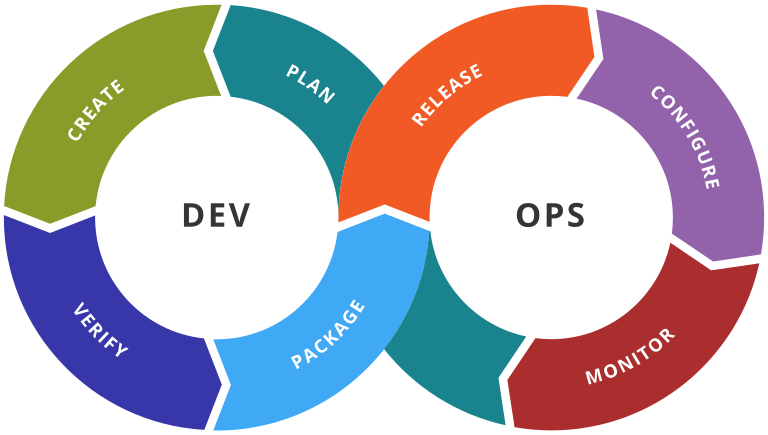
Meanwhile, Agile focuses on iterative development and increments based on customer feedback. It enables organizations to develop and deploy and mainly consider customer feedback. Agile helps bridge the gap between development and customer need; hence, moving on from traditional software development methods.
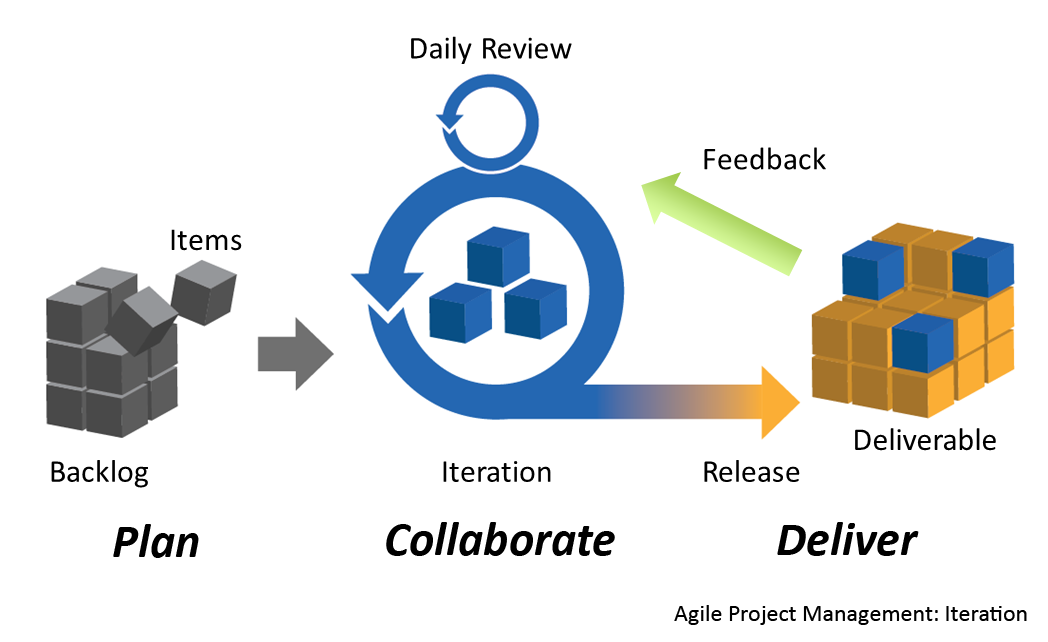
To know more about the difference between DevOps and Agile visit What is DevOps?: The Difference Between DevOps and Agile.
Which DevOps Tools Are You Aware Of?
DevOps uses various tools to plan and collaborate between teams to achieve the DevOps goal. Below are a few important DevOps tools:
- Git, Jira: Used for planning and version control
- Jenkins, Docker: Used for creating and managing build pipelines and code deployment
- JUnit, Selenium: Used for unit testing and other testing methods
- Ansible, Powershell: Used for managing the software during the deployment phase
- Grafana, Splunk, Datalog: Used for monitoring the application in the various environments mainly production
What Are the Different Phases of the DevOps Model?
Various phases of the DevOps model are:
Planning
Planning is the first step of any project. Determining the business plan and requirements then breaking them down for the development teams to take up is a part of the planning process.
Tools used include: Git, Jira
Code
After planning, this is a part of the execution phase where the actual development of software is implemented based on the design.
Tools used include: GitHub, GitLab, Atlassian, Bitbucket
Build
Unlike before, where developers had to run builds and check on code manually, the automated builds are configured and run in this phase. Checks, like code quality, can also be added to the build along with simultaneous deployment.
Tools used include: Docker, Jenkins, Gradle, Maven
Test
Testing is an integral part of the development process. In this phase, the code is tested manually or through automation.
Tools used include: JUnit, Selenium, TestNG, Soap
Deploy
This phase includes the deployment of software by automated releases to production. Deployment builds are scheduled, coordinated, and then run to complete this process.
Tools used include: Jenkins, Kubernetes, Docker
Operate
The managing of software during production comes under this phase.
Tools used include: Ansible, PowerShell, Puppet
Monitor
As the application remains deployed, it is important to monitor the application to catch any errors or bugs that may occur at this phase. Any bug or problem can be isolated quickly using various monitoring tools.
Tools used include: Grafana, Splunk, Datalog, Wireshark
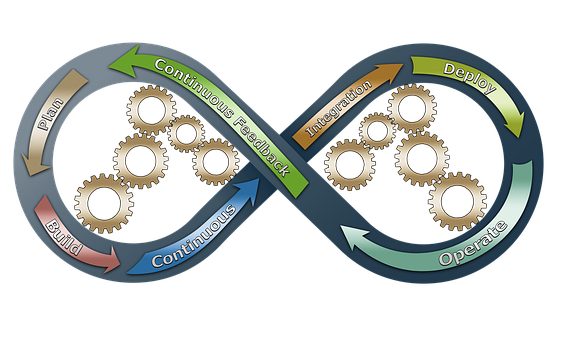
What Are the Main DevOps Practices?
DevOps best practices include:
- Continuous Integration
- Continuous Delivery
- Infrastructure as Code (IaC)
- Microservices
- Monitoring and Logging
- Communication and Collaboration
Know more about each of the DevOps practices in our What is DevOps? article.
What Are Continuous Integration and Continuous Delivery?
Continuous integration refers to new changes continuously rolled out by developers. All of the team members have access to the code base and new updates and tests are performed frequently. Customer feedback, business goals, and other application requirements like configuration updates are made frequently, hence keeping the application up-to-date.
As changes are continuously added to the code base, continuous delivery refers to testing the changes, then adding them to further environments and testing again until the code reaches production. Hence a production-ready version of the application is always present with the team.
What Is the Role of Cloud in DevOps?
Cloud facilitates implementation of the DevOps practices. With scalable infrastructure, configurable environment with versioning, and automated deployments, Cloud makes it easy to manage applications across teams.
All of the team has access to the applications and files on the Cloud, making it easier to collaborate and add to the features. With various cloud providers like AWS, Microsoft Azure, GCP, IBM, etc., new features are added frequently facilitating application development.
Can You Explain the Role of Pipelines in DevOps?
Pipelines play a vital role in DevOps. They are used for builds and deployment automation. Every pipeline is different and teams can configure them according to their project need.
Various steps are configured in the pipelines that help build, test, run quality checks before finally deploying the code in desired environments. Tools like Jenkins are used to manage pipelines.
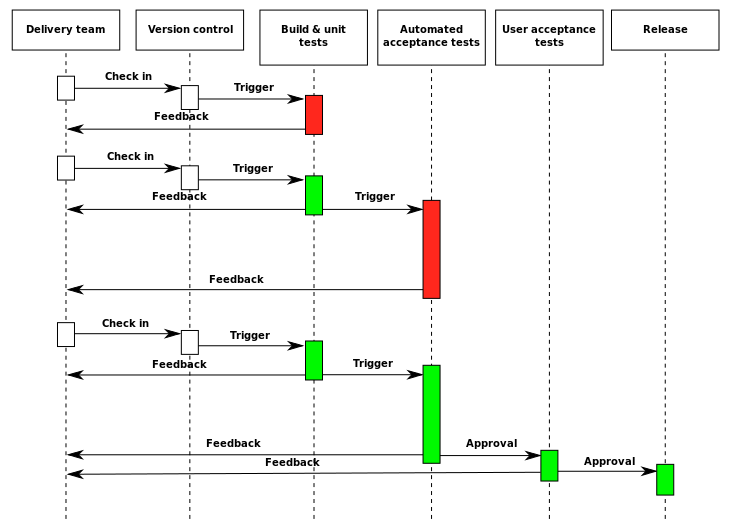
What Is the "Shift Left" Principle in DevOps?
The "Shift Left" principle in DevOps refers to shifting the testing, mainly integration testing, into the earlier stages of development, and adding to the tests as requirements get implemented.
This requires a cultural change in thinking of business where code is the main priority. Many organizations are now using this approach to detect issues at earlier stages, saving a lot of time and maintenance at later stages.
Test-driven development in Agile focuses on testing and writing the test cases based on the requirements and then adding code to support. Similarly, the Shift Left principle focuses on integration testing in the earlier phases of the development lifecycle to achieve a combined goal.
"The Shift Left Principle and DevOps" goes into more detail on the reasoning, history, and proper implementation of the Shift Left principle.
What Is Version Control and How Is It Implemented in DevOps?
Version control is where different versions of a codebase exist so that developers can make necessary changes to the required versions and merge them into a common codebase. The code is also split into various environments in order to test before the code is deployed to production.
In DevOps, version control is achieved using various tools like GitHub, GitLab, and Atlassian. Code is stored in different branches which are merged in the main branch depending on the requirement.
Due to versioning, a developer has a record of all the history and can keep track of all the updates made over time. This helps in detecting issues and bugs and reverting updates in case of need.
What Is the Importance of Security in DevOps? What Do You Know About the Term DevSecOps?
Security is a very important part of any application. Dealing with user data and online transactions has made security a must-have to ensure user data security and prevent any data leaks. The DevOps model enables teams to work together and deliver at a faster speed while overcoming the shortcomings of Agile.
Security is something any application should not compromise on. Developers implement changes by keeping the security of the application in mind. Secure infrastructure, communication between services, and possible data leaks in code security are each important parts of the development, testing, and deployment process.
DevSecOps is a term that adds security to development and operations. As security is made a part of the development process from the beginning of the process, secure and reliable applications can be developed faster. New changes can be added as per business needs and customer feedback.
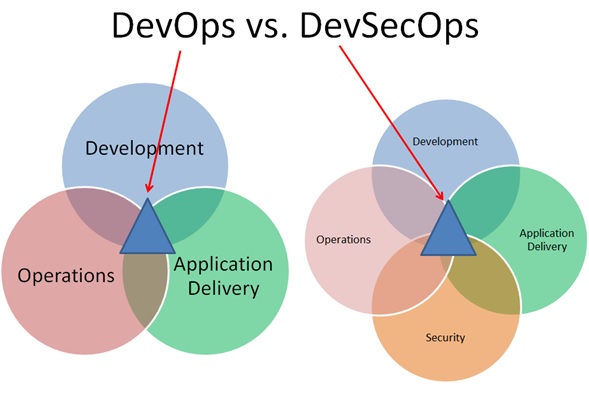
To know more on how to prepare for DevOps interviews and which concepts to be aware of How to Prepare for Your DevOps Interview is an ideal read to help you in getting the desired role.
Top DevOps Online Courses, Certifications, and Training
In order to enter the DevOps world and take up tasks and roles related to DevOps, it is important to be trained and have certifications that can help in getting the desired role.
A few online courses that can help you learn and upskill:
Udemy
Udemy offers a range of various DevOps Courses to choose from.
UpGrad
UpGrad is an advanced certificate program in DevOps.
Coursera
Coursera offers various courses in the DevOps world to choose from.
AWS
Learn about AWS Certified DevOps Engineer - Professional and other courses.
Microsoft Certifications
Visit Microsoft Certifications for various certifications and the path you can take for getting Microsoft DevOps certifications.
Lastly, here are a few free DevOps courses to get started with.
Closing Thoughts
DevOps helps achieve business goals faster. Many organizations are adopting the DevOps culture in order to speed the delivery. Before getting started with a DevOps role, an individual needs to be aware of various tools and processes in order to make informed decisions.
DZone continuously works towards adding the latest content and hot topics in the technology world. We have content for everyone from beginners to experts with interesting topics, tutorials, solutions, and debates in the tech world.
To know more about DevOps, the latest DevOps trends, or to contribute, visit our DevOps Zone.
Opinions expressed by DZone contributors are their own.

Comments